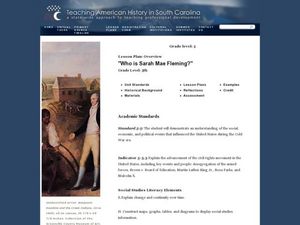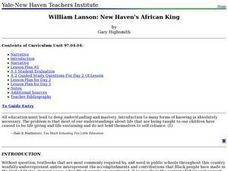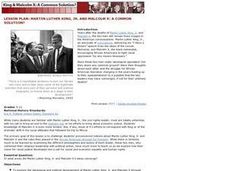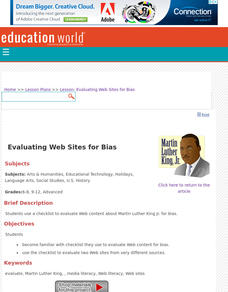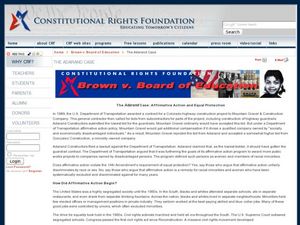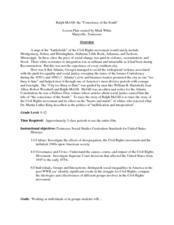Library of Virginia
Antebellum Freedom
From indentured servitude to involuntary race-based servitude, slavery has taken many forms in American history. Class members examine three manumission petitions that reveal how the rights of African Americans and African American...
Curated OER
Fair Responses to Unfair Acts
Students understand the sacrifices and problems in undoing an unfair situation. In this unfairness lesson plan, students discuss the reasons for the Montgomery Boycott and discuss worksheet and feelings about dealing with unfair situations.
Curated OER
Separate is Not Equal: Brown v. Board of Education
Students analyze photographs that feature segregation. In this human rights lesson, students examine photographs of a segregated movie theater, a Ku Klux Klan gathering, a segregated business sign, and an illustration from "Harper's...
Curated OER
We Have a Dream
Students work as partners to study Dr. Martin Luther King's 'I Have a Dream' speech. In this African American history lesson, students work with their cross-grade partner to study, understand, and memorize the speech. Students meet with...
Curated OER
Who Is Sarah Mae Fleming?
Fifth graders learn about two influential women. In this historical figures lesson, 5th graders work in groups to read articles about Rosa Parks and Sarah Fleming and share their findings with the class. Students use a Venn Diagram to...
Curated OER
The Kansas-Nebraska Act of 1854: Popular Sovereignty and the Political Polarization over Slavery
Why did Stephen Douglas support the Kansas-Nebraska Act of 1854? Why did Abraham Lincoln oppose it? Young historians examine how the Kansas-Nebraska Act of 1854 affected the political balance between free and slave states and explore how...
Curated OER
Perseverance and the First Amendment
Students investigate the right to petition and assemble. In this Bill of Rights instructional activity, students read the First Amendment and discuss the rights guaranteed by the amendment. Students research selected groups and movements...
Curated OER
Segregation: From Jim Crow to Linda Brown
Young scholars examine the African American social, economic, and political conditions between 1896 and 1953. In this segregation lesson, students analyze primary sources to develop an understanding of the plight of African Americans'...
Curated OER
William Lanson: New Haven's African King
Learners discuss the misrepresentations of African Americans in the United States. In groups, they examine the life and accomplishments of William Lanson and the importance of extending the Long Wharf. Together, they pretend they lived...
Curated OER
Sojourner Truth
Students research Sojourner Truth. In this African-American history lesson, students read the speech "Ain't I A Woman?" and brainstorm descriptive words that describe Sojourner Truth. Students discuss why her acts were considered...
Curated OER
Martin Luther King, Jr.
Students learn what goals Dr. Martin Luther King, Jr. had when he wanted to change the inequality of the United States.
Curated OER
Martin Luther King, Jr. and Malcolm X: A Common Solution?: Lesson Plan
Students explore the ideological and political development of Martin Luther King, Jr. and Malcolm X through primary source documents. They identify the various personal, social, and political factors that influenced Martin Luther King,...
Curated OER
Evaluating Web Sites for Bias
Students become familiar with checklist they use to evaluate Web content for bias. They use the checklist to evaluate two Web sites from very different sources.
Curated OER
I Have a Metaphor
Learners locate the literary devices used in Martin Luther King Jr.'s "I Have a Dream" speech. In this figurative language lesson plan, young scholars first distinguish between similes, metaphors, analogies, personification, etc....
Alabama Department of Archives and History
What Were They Thinking? Why Some Some Alabamians Opposed the 19th Amendment
To better understand the debate over the 19th Amendment, class members examine two primary source documents that reveal some of the social, economic, racial, and political realities of the time period.
Curated OER
Nativist and Racist Movements in the U.S. and their Aftermath
Students examine the nativist and racist movements in the history of the United States. In groups, they analyze the reactions of religious and ethnic groups to these movements and create a chart to compare the goals of each group. To...
Curated OER
Nonviolent Resistance: Gandhi and King
Students use the internet to research the major events and dates of Mohandas Gandhi and Martin Luther King, Jr. In groups, they use this information to create a poster to present to the class. They reflect on how these two men were...
Curated OER
Reconsidering Malcolm X
Students analyze the strategies and speeches of Malcolm X and Martin Luther King, Jr.
Global Oneness Project
Repairing the Fabric of Democracy
During elections, headlines constantly lament the issue of low voter turnout. Help class members understand why this is such an important topic with relevant articles, a discussion of both sides of the issue, and a reflective essay.
Curated OER
The Adarand Case: Affirmative Action and Equal Protection
Eleventh graders examine the Adarand case. In this American Government lesson, 11th graders create a list of reasons for each affirmative action program. Students develop a defense on certain issues and present it to the class.
Curated OER
The Power of Our Stories
Students compare violence to nonviolence. in this peace activity, students tell stories from their own life that show the difference between violence and nonviolence. They listen to examples of Gandhi and Martin Luther King.
Curated OER
"i Have a Dream" As a Work of Literature
Students read and analyze Martin Luther King Jr.'s "I Have a Dream" speech. They answer discussion questions, and write and compose a speech that addresses an injustice in society.
Curated OER
Ralph McGill: the "Conscience of the South"
Young scholars view a film, "Dawn's Early Light: Ralph McGill and the Segregated South." As groups of students observe the movie, they list key dates, significant persons interviewed, and cultural characteristics. Upon completion of the...
Curated OER
Marian Anderson: From Page to Stage
Students become immersed in a compelling anecdote of the civil rights movement through the experience of constructing dramatic scripts. An added goal is to equip students, through this "hands-on" experience, to critique dramatic...






